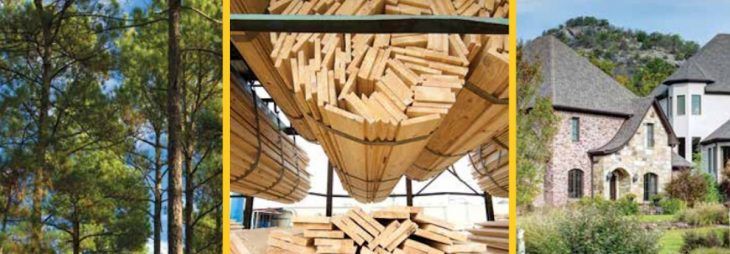Deltic Timber 2Q profits slide 35%, says accessing ‘range of strategic alternatives’
by August 3, 2017 9:57 am 353 views

Deltic Timber Corp.’s second quarter earnings fell short of last year’s results as the Arkansas timberland and real estate firm paid down several million dollars in debt and experienced operational downturns that negatively impacted the company’s manufacturing operations.
For the period ended June 30, Deltic reported second quarter net income of $2.7 million, or 22 cents per share, down 35.7% from year ago results of $4.2 million and 35 cents share. Net sales also declined 2.5% to $55.4 million, compared to $56.8 million in the same period of 2016.
Overall, Deltic officials said the weak second quarter results were due to reduced operating rates in its manufacturing operations from ongoing capital improvement and maintenance projects. In addition, the company paid down $6 million of debt on a revolving credit facility in the three-month period.
“Deltic continues to make progress to sharpen our focus on relentless execution and increase shareholder value,” said Deltic President and CEO John D. Enlow, who took over the reins of the El Dorado company in late February.
And although there was no specific mention of the company’s executive changes in late 2016 and early 2017, including the unexpected resignation of longtime CEO Ray Dillon and the surprise dismissal of the company’s former CFO for misappropriating assets, Enlow did remark that the board was making progress on assessing a “range of strategic alternatives.”
A week before Enlow was hired, Memphis-based Southeastern Asset Management, one of Deltic’s largest institutional shareholders, asked the company’s board of directors to consider a merger or takeover by a larger timberland Real Estate Investment Trust (REIT) such as Weyerhaeuser, Rayonier or Potlatch Corp.
In an SEC filing on Feb. 22, Southeastern said it wanted to play a bigger role and possibly participate in talks to help Deltic build “intrinsic value per share or to cause the company’s true economic value to be recognized.” Southeastern, which holds a 15% stake in the former spin-off of Murphy Oil Corp., also said a REIT with “superior, experience corporate leadership” would remove the need for Deltic to hire a new CEO in a change of control situation that could lead to possible misuse of company assets.
In Wednesday’s financial report, Enlow addressed some of Southeastern’s concerns but made no specific reference about the Memphis-based money manager.
“We made significant progress during the quarter evaluating Deltic’s assets, competitive position, and market risks and opportunities and are now assessing a comprehensive range of strategic alternatives,” Enlow said in a statement. “We remain committed to developing and communicating in a timely fashion a strategic direction that is laser focused on achieving strong operational performance, driving shareholder value and delivering best-in-class returns.”
Companywide, Deltic’s woodlands segment operating income rose to $5 million, compared to $4.4 million in the second quarter of 2016. Net sales also rose slight to $10.2 million, up 7.4% from $9.5 million from a year ago. Company officials said the increase in quarterly earnings was principally due to $1 per ton higher average sawtimber prices, the sale of 20 acres of higher and better use timberland, and higher pulpwood harvests, partially offset by modestly lower sawtimber volumes.
Deltic’s largest division, the company’s manufacturing segment, saw operating income slide nearly 43% to $4 million, compared to $7 million in the same period a year ago. Second quarter manufacturing sales also declined to $45.5 million, compared to $47.3 million in the second quarter of 2016.
In the company’s Little Rock-based real estate division, Deltic operating income was flat at $1.8 million compared to a year ago. Net sales were slightly down to $5.4 million, compared to $5.7 million in the same period of 2016. Company officials said the disappointing results were mostly due to higher commercial acreage revenues, partially offset by fewer residential lot sales with lower average pricing.
Deltic said it sold only four residential lots at $65,000 per lot in West Little Rock’s Chenal Valley, compared to 22 lots at a price of $90,1000 in the second quarter of 2016. Additionally, the company said it placed 69 residential lots under contract at an average price of $62,000. Those deals are expected to close by the end of the third quarter.
“We expect to have an additional 104 lots available at various price points in the Chenal Valley and Wildwood developments during the second half of 2017,” Enlow said. “We also sold a 7.9-acre commercial site during the quarter and remain encouraged by increased interest in our commercial properties.”
At the close of business Wednesday, Deltic’s shares fell 2.25%, or down $1.68 at $69.50 on the New York Stock Exchange. Over the past 52 weeks, the company’s stock has traded at a low of $53.21 to a high of $85.49 per share.
